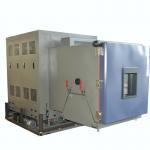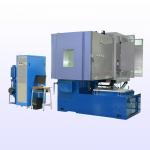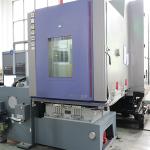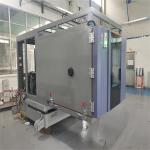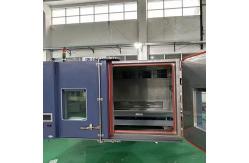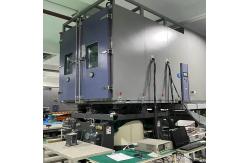In the aerospace and defense sectors, where the margin for error is
infinitesimal, the Customized Climate Chamber with Vibration Test
emerges as a technological marvel. Engineered to meet the exacting
demands of these industries, it serves as a crucible for evaluating
the performance and reliability of components and systems under the
most extreme and realistic conditions. This state-of-the-art chamber is purpose-built to create and
control a highly customized climate environment while
simultaneously subjecting test specimens to precise vibration
stimuli. Tailored specifically for aerospace and Mil-Std defense
testing, it caters to manufacturers, research institutions, and
military organizations. The overarching objective is to replicate
the harsh and dynamic conditions that aerospace and defense
equipment encounter during their operational lifespan. This
includes simulating the extreme temperatures, humidity levels, and
rapid pressure changes experienced in high-altitude flight, as well
as the intense vibrations induced by rocket launches, missile
flights, and the rigors of military vehicle operations. By
subjecting products to such comprehensive testing, potential flaws
and weaknesses can be identified and rectified, ensuring that only
the most robust and reliable components make their way into the
field. - Robust and Modular Construction
- The chamber is constructed with a heavy-duty framework, typically
made of high-strength alloys or carbon steel, to withstand the
substantial forces and stresses associated with vibration testing.
The modular design allows for easy customization and expansion,
enabling it to accommodate a wide variety of test specimen sizes
and configurations. The exterior is clad in a durable,
corrosion-resistant material, such as stainless steel or a
specialized aerospace-grade coating, to protect against the
elements and ensure long-term durability. The interior is lined
with a non-reactive and thermally efficient insulation material,
which not only helps maintain precise temperature and humidity
levels but also minimizes energy consumption. The door is
engineered with a high-precision sealing mechanism and a large,
impact-resistant viewing window, permitting operators to closely
monitor the testing process without compromising the integrity of
the internal environment.
- Precision Climate Control System
- At the core of the chamber's climate control capabilities is a
sophisticated temperature and humidity regulation system. It can
achieve an extensive temperature range, often spanning from -70°C
to +150°C, with an accuracy of ±0.5°C. The humidity control range
extends from 5% to 95% relative humidity, with an accuracy of ±3%
RH. This is made possible by a combination of high-capacity
refrigeration units, powerful heating elements, and advanced
humidification and dehumidification mechanisms. The system is
governed by a highly intelligent PID controller, which continuously
monitors and adjusts the climate parameters based on real-time
feedback from a network of strategically placed sensors throughout
the chamber. Additionally, the chamber can simulate rapid
temperature transitions and altitude-induced pressure changes,
replicating the extreme thermal and barometric conditions that
aerospace and defense equipment must endure.
- Advanced Vibration Testing System
- The vibration testing subsystem is a technological tour de force.
It is capable of generating a vast spectrum of vibration
frequencies and amplitudes, accurately mimicking the diverse
vibration profiles encountered in aerospace and defense
applications. The system can produce frequencies ranging from a few
hertz to several kilohertz and amplitudes up to several
millimeters. It employs a combination of electrodynamic shakers,
servo-hydraulic actuators, and precision control algorithms to
ensure that the vibration stimuli are precisely and consistently
applied to the test specimens. The vibration table is designed to
have minimal resonance and excellent force and displacement
accuracy, allowing for highly accurate and repeatable testing. The
system can also be programmed to execute complex vibration
sequences, such as random vibration profiles simulating the
turbulent flight conditions or shock pulses replicating the impact
of missile launches or hard landings.
- Intuitive Control and Data Acquisition Interface
- The chamber is equipped with an ergonomic and highly intuitive
control panel, which simplifies the operation and parameter setting
for even the most complex testing scenarios. Operators can
effortlessly configure the temperature, humidity, vibration
frequency, amplitude, test duration, and other critical parameters
using a user-friendly touchscreen interface. The control panel also
provides real-time visualizations of the current test conditions,
including temperature and humidity trends, vibration waveforms, and
any system alarms or warnings. Integrated within the chamber is a
comprehensive data acquisition system that records every aspect of
the testing process. It captures temperature and humidity
histories, vibration spectra, and any observable changes or
responses in the test specimens. The data can be stored in a
high-capacity internal memory or exported to external storage
devices for in-depth analysis. The system is also capable of
generating detailed test reports in various industry-standard
formats, facilitating seamless documentation and sharing of results
among different stakeholders.
- Safety and Monitoring Systems
- To safeguard both the testing equipment and the surrounding
environment, the chamber is outfitted with a comprehensive suite of
safety features. These include over-temperature and over-pressure
protection circuits, emergency stop buttons, and fail-safe
mechanisms that automatically shut down the system in the event of
a malfunction or abnormal condition. The vibration testing system
is equipped with overload protection and displacement limit sensors
to prevent damage to the shakers and the test specimens.
Additionally, the chamber is integrated with a continuous
monitoring system that tracks the health and performance of all
critical components, providing proactive alerts for preventive
maintenance and ensuring the long-term reliability and availability
of the testing facility.
- Temperature Range and Accuracy
- With a temperature range of -70°C to +150°C and an accuracy of
±0.5°C, the chamber can subject aerospace and defense components to
a wide gamut of thermal conditions. This is essential for testing
materials and systems that must function reliably in the extreme
cold of outer space or the intense heat generated during supersonic
flight or missile propulsion. The precise temperature control
ensures that the test conditions are accurately replicated,
yielding reliable and reproducible results.
- Humidity Range and Accuracy
- The humidity range of 5% to 95% RH, with an accuracy of ±3% RH,
allows for a comprehensive assessment of the impact of moisture on
the performance and durability of test specimens. In aerospace
applications, humidity can affect the integrity of electronic
components, the corrosion resistance of metals, and the
functionality of composite materials. The ability to precisely
control humidity levels enables manufacturers and researchers to
understand and mitigate these potential issues.
- Vibration Parameters
- The vibration testing system offers a frequency range from 2 Hz to
5000 Hz and amplitudes up to 50 mm. These parameters can be
adjusted in infinitesimal increments to create highly customized
vibration profiles. For example, in aerospace testing,
low-frequency vibrations may simulate the oscillations of a large
aircraft structure during flight, while high-frequency vibrations
can replicate the excitation of small components due to engine
vibrations or aerodynamic forces. The precise control over
vibration amplitudes and frequencies is crucial for accurately
assessing the fatigue life and mechanical integrity of test
specimens.
- Testing Volume and Payload Capacity
|
